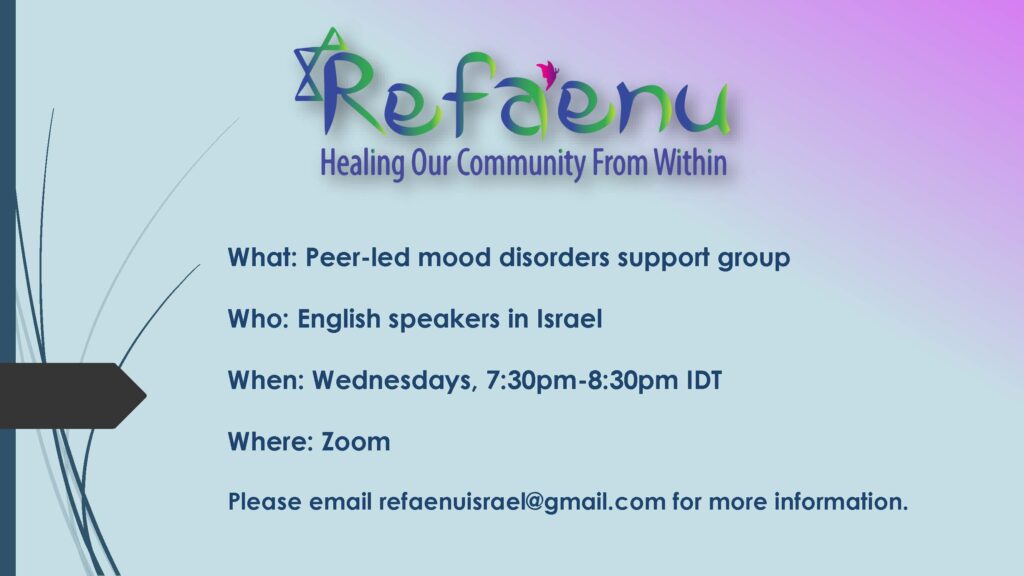Israel:

Press about the Israel support group:
United States:
 Please contact dena@refaenu.org if you are interested in participating in Refa’enu’s Zoom support groups. We have one group for people with depression and bipolar disorder, and one group for family & friends of people with depression and bipolar disorder.
Please contact dena@refaenu.org if you are interested in participating in Refa’enu’s Zoom support groups. We have one group for people with depression and bipolar disorder, and one group for family & friends of people with depression and bipolar disorder.
Mood Disorders – Tuesdays @7:30pm ET
Family & Friends – Thursdays @8pm ET
WHAT ARE MOOD DISORDER SELF-HELP SUPPORT GROUPS AND WHY ARE THEY A CRITICAL COMPONENT TO RECOVERY?
Self-help means self-guided improvement, often without a professional. People can benefit from self-help meetings in ways that a mental health professional cannot provide, such as a sense of belonging, sharing experiences, feeling understood, and companionship. Each person’s path to wellness is uniquely their own and is their own responsibility. Peers in the group can assist, encourage, and empower one another in their own individual pursuit of wellness. Self-help support groups, for those who have mood disorders as well as their loved ones, are critical to a meaningful part of recovery. Also known as “rap” and “share/care” groups, they are attended and “hosted” or “facilitated” by peers.
- They offer an alternative to isolation and help foster a sense of real belonging.
- They foster hope and empowerment in an encouraging environment.
- They allow peers in different stages of their illness and recovery to share their most private concerns and feelings in a safe environment.
- They provide a forum for those suffering from the illness to feel heard, find empathy, solace, and reassurance.
- They reveal successful experiences with treatment and recovery approaches, and important long-term coping strategies.
- They help restore self-respect, self-acceptance, and belief in the possibility of getting and staying well.
- They encourage the motivation and determination required for taking charge of the illness.
GENERAL PHILOSOPHY BEHIND SUPPORT GROUPS FOR THOSE WITH MOOD DISORDERS:
Self-help support groups for those with mood disorders generally agree on the guiding principle that a combination of psychopharmacology, one-on-one therapy, and self-help support is the most effective approach to recovery.
- Psychopharmacology – for proper assessment and diagnosis for treatment with medication to stabilize the illness.
- One-on-one psychotherapy – to help explore and change the behaviors that exacerbate the mood disorder and negatively impact personal and professional lives.
- Self-help support – promotes a sense of belonging, self-acceptance, the motivation to take responsibility for the illness, and the belief that recovery is possible.
REFA’ENU TALKS PEER SUPPORT:
A live chat with Refuat Hanefesh:
Check out this webinar/study session about the evolution of Refa’enu’s support groups, posted as part of an Inclusion Initiative by the URJ and Ruderman Family Foundation: